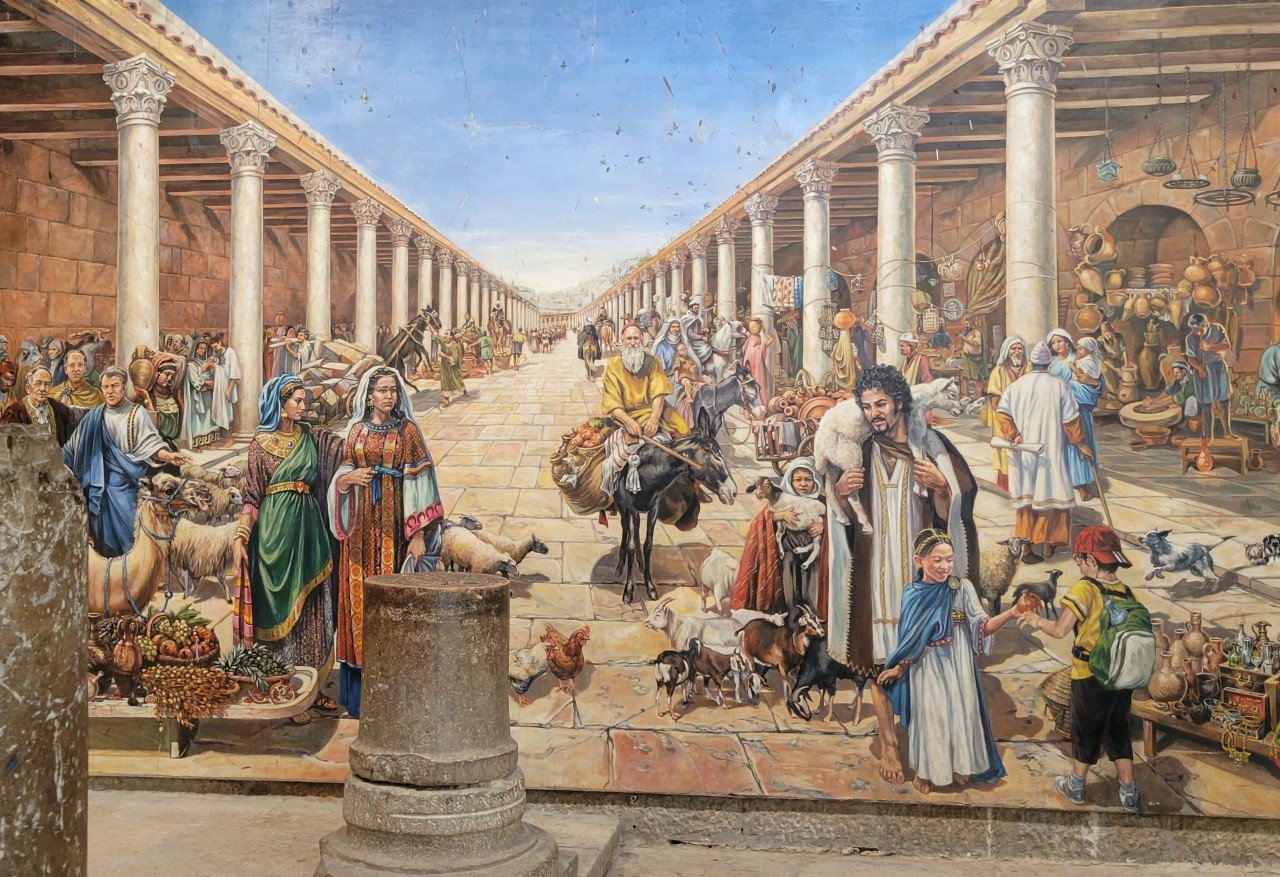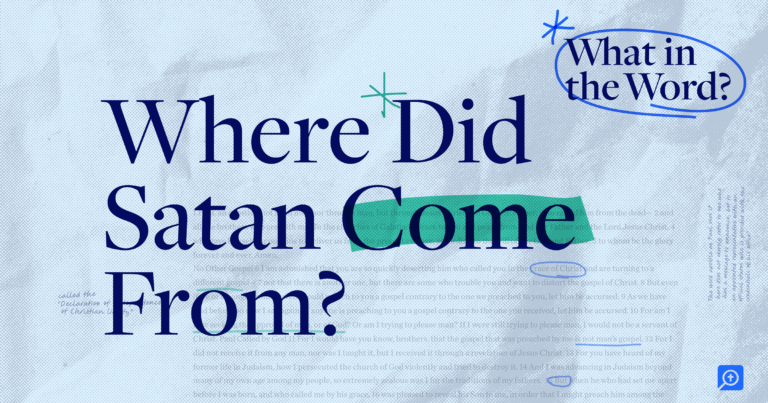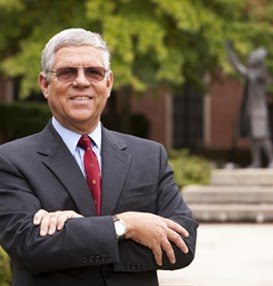Two Lost Sons
The Bible’s most potent depiction of the truth that there’s more than one way to be lost is crystallized in Luke 15:11–32. The broad outline of the parable is familiar: a father has two sons, the younger of whom demands his share of the inheritance and then moves to a far country, where he squanders it on wild living. Eventually, after coming to his senses, the prodigal returns home empty-handed and broken; he simply hopes his father will take him back as a hired servant. But seeing his wayward son from a long way off, the father runs to meet him and requests a party thrown in his honor.
Many people tend to stop there, at least in terms of emphasis, which is why it’s known to history as the parable of the prodigal son—singular. But the returning son isn’t the only prodigal. That’s actually the whole point. Jesus is not addressing the wayward but is aiming the story, like a heatseeking missile, at the religiously devout. Note the context of the chapter:
Now the tax collectors and sinners were all drawing near to hear [Jesus]. And the Pharisees and the scribes grumbled, saying, “This man receives sinners and eats with them.” So he told them this parable. . . . (Luke 15:1–3)
In light of the audience, then, we dare not overlook the dramatic final scene:
Now [the father’s] older son was in the field, and as he came and drew near to the house, he heard music and dancing. And he called one of the servants and asked what these things meant. And he said to him, “Your brother has come, and your father has killed the fattened calf, because he has received him back safe and sound.” But he was angry and refused to go in. His father came out and entreated him, but he answered his father, “Look, these many years I have served you, and I never disobeyed your command, yet you never gave me a young goat, that I might celebrate with my friends. But when this son of yours came, who has devoured your property with prostitutes, you killed the fattened calf for him!” And he said to him, “Son, you are always with me, and all that is mine is yours. It was fitting to celebrate and be glad, for this your brother was dead, and is alive; he was lost, and is found.” (Luke 15:25–32)
Tim Keller on the Christian Life
Matt Smethurst
Matt Smethurst distills over 40 years of Tim Keller’s teaching topic by topic—drawing from popular books to lesser-known conference talks, interviews, and sermons—to present practical insight for generations of readers eager to grow in their walk with Christ.
On September 11, 2005, Keller preached a sermon titled “The Prodigal Sons”—plural—which became the genesis of his 2008 bestseller The Prodigal God: Recovering the Heart of the Christian Faith. This book captures the most distilled essence of Keller’s teaching regarding the heart. Near the beginning he credits a sermon on Luke 15 by his mentor, Ed Clowney, that altered his understanding:
Listening to that sermon changed the way I understood Christianity. I almost felt I had discovered the secret heart of Christianity. Over the years I have often returned to teach and counsel from the parable. I have seen more people encouraged, enlightened, and helped by this passage, when I explained the true meaning of it, than by any other text.1
That last sentence is a remarkable statement. What about the parable is so powerful? If you compare the teaching of Jesus to a lake, Keller says, this parable is “one of the clearest spots where we can see all the way to the bottom.”2 And that’s because what Jesus says about the elder brother is one of Scripture’s most vital teachings.3 We impoverish ourselves, therefore, when we fixate on the younger brother:
The first time I heard the parable, I imagined Jesus’s original listeners’ eyes welling with tears as they heard how God will always love and welcome them, no matter what they’ve done. We sentimentalize this parable if we do that. The targets of this story are not “wayward sinners” but religious people who [think they] do everything the Bible requires. Jesus is pleading not so much with immoral outsiders as with moral insiders. He wants to show them their blindness, narrowness, and self-righteousness, and how these things are destroying both their own souls and the lives of the people around them. It is a mistake, then, to think that Jesus tells this story primarily to assure younger brothers of his unconditional love.4
Apart from Jesus Christ, flagrant lawbreaking and fastidious rule keeping are dead ends. In Keller’s words: “Jesus’s purpose is not to warm our hearts but to shatter our categories.”5
Each brother in the parable represents “a different way to be alienated from God”6—and both ways are strikingly resonant with the latemodern West. Keller dubs the approaches “the way of moral conformity and the way of self-discovery.”7 In fact, he observes, Western culture is “so deeply divided between these two approaches”8 that it’s difficult to imagine an alternative option:
If you criticize or distance yourself from one, everyone assumes you have chosen to follow the other, because each of these approaches tends to divide the whole world into two basic groups. The moral conformists say: “The immoral people—the people who ‘do their own thing’—are the problem with the world, and moral people are the solution.” The advocates of self-discovery say: “The bigoted people—the people who say, ‘We have the Truth’—are the problem with the world, and progressive people are the solution.” Each side says: “Our way is the way the world
will be put to rights, and if you are not with us, you are against us.”9
But King Jesus is not kind to false dichotomies. Nor is he beholden to natural expectations:
So we have two sons, one “bad” by conventional standards and one “good,” yet both are alienated from the father. The father has to go out and invite each of them to come into the feast of his love. . . .
But Act 2 comes to an unthinkable conclusion. Jesus the storyteller deliberately leaves the elder brother in his alienated state. The bad son enters the father’s feast but the good son will not. The lover of prostitutes is saved, but the man of moral rectitude is still lost. We can almost hear the Pharisees gasp as the story ends. It was the complete reversal of everything they had ever been taught.10
Both sons are lost, but only one knows it. You are lost, Jesus is saying, but you refuse to know it.
Self-Salvation Projects
It’s sobering to notice that when the older son protests, “Look, these many years I have served you, and I never disobeyed your command” (Luke 15:29), the father doesn’t disagree! His firstborn has been obedient; he has done everything “right.” And ironically, it’s keeping him fromthe feast. His outward goodness—and resultant pride—has erected a barrier between him and the father’s love.
An elder-brother mindset can haunt us all. Keller offers an example:
I knew a woman who had worked for many years in Christian ministry. When chronic illness overtook her in middle age, it threw her into despair. Eventually she realized that deep in her heart she felt that God owed her a better life, after all she had done for him. That assumption made it extremely difficult for her to climb out of her pit, though climb she did. The key to her improvement, however,was to recognize the elder-brother mindset within.
Elder brothers obey God to get things. They don’t obey God to get God himself—in order to resemble him, love him, know him, and delight him. So religious and moral people can be avoiding Jesus as Savior and Lord as much as the younger brothers who say they don’t believe in God and define right and wrong for themselves.11
The stakes are that high. If you think God should accept you because you’re good, “then Jesus may be your helper, your example, even your inspiration, but he is not your Savior.” How could he be? You are occupying that role.11 Keller concludes,
So there are two ways, not one, to be your own Savior and Lord: you can break all the moral rules and chart your own course, or you can try keeping all the external moral rules and seek to earn heaven’s favor. Both are strategies for avoiding God. Apart from Jesus Christ, every person is “dedicated to a project of self-salvation, to using God and others in order to get power and control for themselves. We are just going about it in different ways.”12
King Jesus is not kind to false dichotomies. Nor is he beholden to natural expectations.
Equally Wrong, Not Equally Dangerous
By the end of Jesus’s parable, only one son has been reconciled to his father. Why conclude like this? Why not show us a redemptive arc for Tim both brothers? The reason certainly isn’t that elder brothers are hopeless; if they were, the father wouldn’t have gone into the field and pleaded at all. We can’t know for sure, of course, but perhaps Jesus is conveying that while “both forms of the self-salvation project are equally wrong,” they are not “equally dangerous.”13 The younger brother’s rebellion is obvious; the elder brother’s is not. And therein lies the danger:
He would have been horribly offended by the suggestion that he was rebelling against the father’s authority and love, but he was, deeply. Because the elder brother is more blind to what is going on, being an elder-brother Pharisee is a more spiritually desperate condition. “How dare you say that?” is how religious people respond if you suggest their relationship with God isn’t right. “I’m there every time the church doors are open.” Jesus says, in effect, “That doesn’t matter.”14
The takeaway, Keller says, is shocking: “Careful obedience to God’s law may serve as a strategy for rebelling against God.”15 He often returned to an image of two people sitting side by side in the same pew—hearing the same sermons, singing the same songs, engaging in the same spiritual activities—but for utterly different reasons. One does it all to please God; the other does it to justify self.
And yet on the outside, they look exactly the same.16
The True Elder Brother
When it comes to pleasing God, both the rebellious path and the religious path are dead ends. But Jesus shows us a more excellent way. It is not a comfortable middle option between earthly extremes, for his gospel occupies a transcendent plane.17
In the parable, the older son should have gone into the far country in pursuit of his wayward brother. He should have rejoiced at his return. He should have gladly relinquished part of his inheritance in order to reinstate his brother’s. He should have joined the party. But, as Keller observes, “By putting a flawed elder brother in the story, Jesus is inviting us to imagine and yearn for a true one.”18
Jesus Christ is the ultimate elder brother who didn’t just travel to a far country; he descended from heaven to earth to seek and save the lost. “Who is the true elder brother?” Keller asked in a funeral sermon for his own younger brother Billy. “Who is the one who truly obeyed the Father completely? Who truly has lost his robe so he [could] put it on us? Jesus!”19 He is the “God of Great Expenditure,”20 who, at infinite cost to himself, paid our debt and now binds our wounds and brings us home to the Father.
This message is true, but it’s not tame. The process of reckoning with it is disruptive to idol-ridden hearts. Keller recounts a time when a woman coming to Redeemer was hearing, for the first time, that she could be accepted not on the basis of her behavior but by God’s sheer grace. Keller was intrigued by her response: “That is a scary idea! Oh, it’s good scary, but still scary.” When he asked what was so scary about unmerited free grace, she replied,
If I was saved by my good works—then there would be a limit to what God could ask of me or put me through. I would be like a taxpayer with rights. I would have done my duty and now I would deserve a certain quality of life. But if it is really true that I am a sinner saved by sheer grace—at God’s infinite cost—then there’s nothing he cannot ask of me.
Keller comments,
She could see . . . the wonderful-beyond-belief teaching of salvation by sheer grace had two edges to it. On the one hand it cut away slavish fear. God loves us freely, despite our flaws and failures. Yet she also knew that if Jesus really had done this for her—she was not nher own. She was bought with a price.21
As we wait in hope for the ultimate feast and eternal party, may we never get over what it cost to bring us home. In December 1662, a Scottish minister named David Dickson lay dying when a close friend of over fifty years arrived to inquire how he was. The eighty-year-old man replied, “I have taken all my good deeds, and all my bad deeds, and have cast them together in a heap before the Lord, and have fled from both to Jesus Christ, and in him I have sweet peace.”22
That is the message of the gospel, and it is the message Tim Keller loved to communicate. Don’t just flee your bad works. Flee your “good” works, too. Flee them both and collapse into the open arms of Jesus Christ.
Notes:
- Timothy Keller, The Prodigal God: Recovering the Heart of the Christian Faith (New York: Penguin, 2008), xvii. Clowney’s sermon, “Sharing the Father’s Welcome,” is available in Edmund P. Clowney, Preaching Christ in All of Scripture (Wheaton, IL: Crossway, 2003).
- Keller, Prodigal God, xvii.
- Keller, Prodigal God, xix.
- Keller, Prodigal God 12.
- Keller, Prodigal God, 13.
- Keller, Prodigal God, 9.
- Keller, Prodigal God, 34. See also Tim Keller, “The Prodigal Sons,” preached on September 11, 2005, and “The Lord of the Sabbath,” preached on February 19, 2006. He writes, “Each acts as a lens coloring how you see all of life, or as a paradigm shaping your understanding of everything. Each is a way of finding personal significance and worth, of addressing the ills of the world, and of determining right from wrong,” Keller, Prodigal God, 34.
- Keller, Prodigal God, 37.
- Keller, Prodigal God, 37. As Keller explains in a sermon, “Jesus says, ‘You’re both wrong. You’re both lost. You’re both making the world a terrible place in different ways.’ The elder brothers of the world divide the world in two. They say, ‘The good people are in, and the bad people (you) are out.’ The younger brothers do as well—the self-discovery people also divide the world in two. They say, ‘The open-minded, progressive-minded people are in, and the bigoted and judgmental people (you) are out.’ Jesus says neither. He says, ‘It’s the humble who are in and the proud who are out.’ ” Keller, “The Prodigal Sons.”
- Keller, Prodigal God, 40.
- Keller, Prodigal God, 48. In a 1992 sermon, Keller remarked, “I’ve seen plenty of people—who have been non-Christians and skeptical and under the influence of the flesh—come on into the Christian faith, and their flesh continues to dominate them, because now they find religious ways of avoiding God, whereas before they were finding irreligious ways.” Tim Keller, “Alive with Christ: Part 2,” preached on November 8, 1992.
- Keller, Prodigal God, 44.
- Keller, Prodigal God, 45.
- Keller, Prodigal God, 51.
- Keller, Prodigal God, 53.
- Keller, Prodigal God, 54. Keller explains further, “The younger brother knew he was= alienated from the father, but the elder brother did not. That’s why elder-brother lostness is so dangerous. Elder brothers don’t go to God and beg for healing from their condition. They see nothing wrong with their condition, and that can be fatal. If you know you are sick you may go to a doctor; if you don’t know you’re sick you won’t—you’ll just die.” Keller, 75.
- Keller, Prodigal God, 43.
- See, for example, “Preaching the Gospel,” 2009 Newfrontiers Conference at Westminster Chapel in London, available at https:// vimeo .com /3484464. Elsewhere was a gardener who grew an enormous carrot. He took it to his king and said, ‘My lord, this is the greatest carrot I’ve ever grown or ever will grow; therefore, I want to present it to you as a token of my love and respect for you.’ The king was touched and discerned the man’s heart, so as he turned to go, the king said, ‘Wait! You are clearly a good steward of the earth. I own a plot of land right next to yours. I want to give it to you freely as a gift, so you can garden it all.’ The gardener was amazed and delighted and went home rejoicing. But there was a nobleman at the king’s court who overheard all this, and he said, ‘My! If that is what you get for a carrot, what if you gave the king something better?’ The next day the nobleman came before the king, and he was leading a handsome black stallion. He bowed low and said, ‘My lord, I breed horses, and this is the greatest horse I’ve ever bred or ever will; therefore, I want to present it to you as a token of my love and respect for you.’ But the king discerned his heart and said, ‘Thank you,’ and took the horse and simply dismissed him. The nobleman was perplexed, so the king said, ‘Let me explain. That gardener was giving me the carrot, but you were giving yourself the horse.’ ” Timothy Keller, The Gospel in Life Study Guide: How Grace Changes Everything (Grand Rapids, MI: Zondervan, 2010), 17. Keller first shared this illustration at Redeemer on May 5, 1996. Though he attributes it to Charles Spurgeon, I cannot find the original source.
- Keller states, “It’s off the scales. It’s not halfway in the middle. It’s something else [entirely].” Keller, “The Prodigal Sons.”
- Keller, Prodigal God, 94.
- Hansen, Timothy Keller, 218 (emphasis original). As a young man, Keller had, in a sense, embodied both younger-brother and elder-brother tendencies: “Tim was the oldest child who always did the right thing, and yet at the same time when he went off to college he really did rebel, and he rebelled in large part against his [overbearing] mother. He was torn between the dynamics of wanting to do the right thing, but also the pressures of falling far short. . . . Once I saw that [he had demonstrated the proclivities of both sons], all of a sudden Tim’s core message of the transforming power of grace—this gift from God that changes everything about our lives—made a lot more sense.” Hansen, “Collin Hansen on The Making of Tim Keller, Overcoming Loneliness, Tim’s Teenage Rebellion, How He Finished Well, and Why He Wanted People to Know About His Weaknesses,” The Carey Nieuwhof Leadership Podcast, July 11, 2023, https:// care ynieuwh of .com/. In his book, Hansen also shares a poignant story about Tim’s literal younger (and only) brother Billy, a gay man who died of complications from AIDS in 1998: “[Over the years] when they visited [Billy and his partner], Tim and Kathy talked to him about the gospel. . . . Tim tried to emphasize the difference between grace and the legalism of their childhood. . . . [Eventually] when Billy entered hospice in December [1997], he said to Tim, ‘My Christian family isn’t going to come with me when I enter eternity, and neither are my gay friends. So I have to figure out what is on the other side of this life.’ . . . [Billy] had thought being a Christian meant cleaning up his life and making himself righteous. But Tim pointed to 2 Corinthians 5:21: ‘For our sake he made him to be sin who knew no sin, so that in him we might become the righteousness of God.’ Finally, Billy felt God’s love. The transformation was immediately evident. He even called his lawyer and told him to give his money [marked for donation to gay causes] to [a local] ministry instead. . . . When all hope seemed lost, God welcomed this prodigal son home.” Hansen, Timothy Keller, 218–20.
- Keller, Prodigal God, xx.
This article is adapted from Tim Keller on the Christian Life: The Transforming Power of the Gospel by Matt Smethurst.

Matt Smethurst is lead pastor of River City Baptist Church in Richmond, Virginia. He is the author of several books, including Tim Keller on the Christian Life; Before You Open Your Bible; Before You Share Your Faith; and Deacons. He also cohosts, with Ligon Duncan, The Everyday Pastor podcast from the Gospel Coalition. Matt and his wife, Maghan, have five children.
Related Articles
Finding God's Grace While Waiting for a Prodigal
May 26, 2016By God’s grace, waiting on a prodigal can actually strengthen your faith.
Tim Keller on the Purpose of Your Job, Your Life, and the Universe
April 13, 2025Does Monday morning excite you? If so, that’s great, but that’s not how many of us feel. Our jobs challenge us, exhaust us, and sometimes threaten to consume us.
My Child’s Wandering Heart and My Father’s Never-Ending Love
October 28, 2024If you’re a parent, you’ve likely seen that natural tendency in your children to wander (or run!) from what God says is best—even if the nature of it looks different with each child.
Reading the Parable of the Prodigal Son on the Shoulders of Giants
February 05, 2025Read the parable of the prodigal son in Luke 15 and reflect on the magnificence of this story from Jesus along with commentary notes from gifted teachers throughout church history.
Crossway is a not-for-profit Christian ministry that exists solely for the purpose of proclaiming the gospel through publishing gospel-centered, Bible-centered content. Learn more or donate today at crossway.org/about.












 English (US) ·
English (US) ·